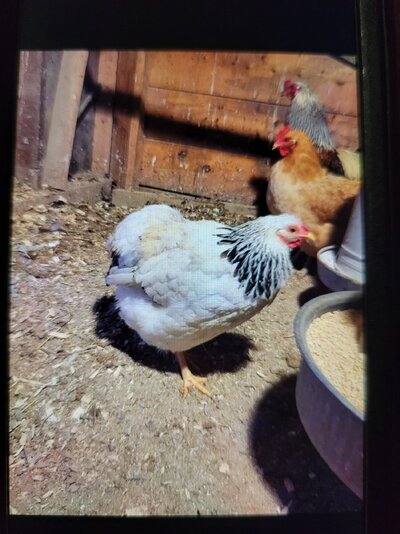Hello all - we have a young (I'm guessing 18mo to 2yrs old) Columbian Wyandotte hen we got from a commercial farm a few months ago. She came with three others hens, all were in pretty tough shape (they'd be cannibalizing each other's tails, were underweight, one had vent gleet, just obviously had been really stressed and none were laying.) This Wyandotte in particular had a puffy appearance even back then, but she gained weight, her feathers came back, she ate and drank and seemed quite content and then started laying again about 6 weeks ago.
However, she's maintained a droopy-tailed, puffy appearance since we brought her home. It's more apparent now because she grew back actual tail feathers.
She's been dewormed and otherwise seems in good health. She's very, very mild-tempered and always has been and seems content except for this hunched up, droopy, puffy posture.
She stopped laying suddenly about ten days ago. I've palpated her but she's not egg bound. She continues to eat and drink well. It's bitterly cold in Vermont right now and because we don't know what's wrong with her we brought her into the house for the next few days until the temperature evens out so we can keep an eye on her. Everyone else in the flock seems healthy and happy.
I believe this posture is a general "unwell" or pain posture in hens, but because we can't pinpoint any other symptoms I am not sure what to do for her.
However, she's maintained a droopy-tailed, puffy appearance since we brought her home. It's more apparent now because she grew back actual tail feathers.
She's been dewormed and otherwise seems in good health. She's very, very mild-tempered and always has been and seems content except for this hunched up, droopy, puffy posture.
She stopped laying suddenly about ten days ago. I've palpated her but she's not egg bound. She continues to eat and drink well. It's bitterly cold in Vermont right now and because we don't know what's wrong with her we brought her into the house for the next few days until the temperature evens out so we can keep an eye on her. Everyone else in the flock seems healthy and happy.
I believe this posture is a general "unwell" or pain posture in hens, but because we can't pinpoint any other symptoms I am not sure what to do for her.




